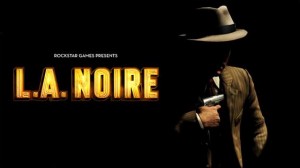 Congratulations to Dr Richard Berger, Associate Professor and Head of Postgraduate Research in the Media School, who has won an AHRC grant to research how the videogame L.A. Noire (which was released for Playstation 3 and XBOX 360 in May 2011) can be used to teach the English Literature curriculum. This is a collaborative grant led by Dr Julian McDougall at the University of Wolverhampton. Richard and Julian have collaborated previously on a number of journal papers, and are co-editors of the Media Education Research Journal.
Congratulations to Dr Richard Berger, Associate Professor and Head of Postgraduate Research in the Media School, who has won an AHRC grant to research how the videogame L.A. Noire (which was released for Playstation 3 and XBOX 360 in May 2011) can be used to teach the English Literature curriculum. This is a collaborative grant led by Dr Julian McDougall at the University of Wolverhampton. Richard and Julian have collaborated previously on a number of journal papers, and are co-editors of the Media Education Research Journal.
About the AHRC award: The diegesis is set in 1947, and the game appropriates conventions from American film noir texts of the 1940s and 1950s, as well as later texts such as Alphaville (Godard, 1965) and L.A. Confidential (Hanson, 1997). The novels of Elmore Leonard and James Ellroy also contribute to this sphere of influence. Unlike these novels and films, this videogame is an author / auteur-less digital text which is pre-designed but ‘written’, in narrative terms, only when read (played). However, its highly literary and filmic nature would seem to be useful for teaching / learning in the English Literature curriculum.
 As a research subject, L.A. Noire offers an opportunity to revisit ideas of adaptation and appropriation in the context of this digital transformation of the ‘hard-boiled detective novel’, and to further examine the relationship of exchange that exists between linear and digital texts. Videogames are still largely ignored in education as textual subjects but L.A. Noire is potentially transgressive, in terms of its potential to be taught / studied as a book (novel) in its digitally transformed state.
As a research subject, L.A. Noire offers an opportunity to revisit ideas of adaptation and appropriation in the context of this digital transformation of the ‘hard-boiled detective novel’, and to further examine the relationship of exchange that exists between linear and digital texts. Videogames are still largely ignored in education as textual subjects but L.A. Noire is potentially transgressive, in terms of its potential to be taught / studied as a book (novel) in its digitally transformed state.
This project will explore the ways in which gamer-students and teachers might work with L.A. Noire to reconfigure dynamics of expertise, begin a remediation of the English Literature curriculum and respond to the digital transformation of what we think it means to ‘read’ in order to think differently about the function of books and the nature of textual authority in the digital age.
Congratulations Richard – this is an excellent achievement! 😀
Richard is a peer reviewer for the AHRC which he believes directly informs his own bidding activity – you can read his review of the benefits of being a peer reviewer here: Life as an AHRC Peer Reviewer. He has also made use of our internal peer review service (the RPRS) to help to strengthen his proposals prior to submission – you can read his review of the RPRS here: One Man’s Experience of the Research Proposal Review Service











 Nursing Research REF Impact in Nepal
Nursing Research REF Impact in Nepal Fourth INRC Symposium: From Clinical Applications to Neuro-Inspired Computation
Fourth INRC Symposium: From Clinical Applications to Neuro-Inspired Computation ESRC Festival of Social Science 2025 – Reflecting back and looking ahead to 2026
ESRC Festival of Social Science 2025 – Reflecting back and looking ahead to 2026 3C Event: Research Culture, Community & Cookies – Tuesday 13 January 10-11am
3C Event: Research Culture, Community & Cookies – Tuesday 13 January 10-11am Dr. Chloe Casey on Sky News
Dr. Chloe Casey on Sky News ECR Funding Open Call: Research Culture & Community Grant – Application Deadline Friday 12 December
ECR Funding Open Call: Research Culture & Community Grant – Application Deadline Friday 12 December MSCA Postdoctoral Fellowships 2025 Call
MSCA Postdoctoral Fellowships 2025 Call ERC Advanced Grant 2025 Webinar
ERC Advanced Grant 2025 Webinar Horizon Europe Work Programme 2025 Published
Horizon Europe Work Programme 2025 Published Update on UKRO services
Update on UKRO services European research project exploring use of ‘virtual twins’ to better manage metabolic associated fatty liver disease
European research project exploring use of ‘virtual twins’ to better manage metabolic associated fatty liver disease